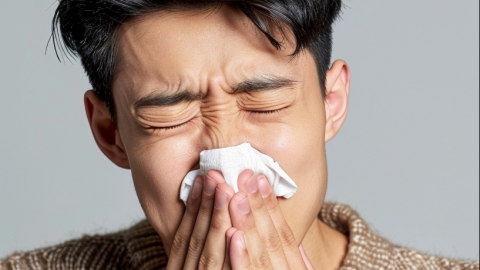Sneezing, tearing, runny nose - what should I do?
Generally, sneezing, tearing, and a runny nose may be caused by irritants or foods, allergic reactions, viral colds, conjunctivitis, sinusitis, or other factors. General treatment and medication can help alleviate these symptoms. It is advisable to seek medical attention promptly and follow medical advice for treatment. Details are as follows:

1. Irritating odors or foods: Consuming spicy foods, cold beverages, or exposure to irritating odors may stimulate facial nerves, causing sneezing accompanied by tearing and a runny nose. Avoid contact with irritants, maintain fresh air, and eat appropriately.
2. Allergic reaction: When sneezing occurs, the facial nerves associated with the throat, nasal passages, and eyes are stimulated, triggering reflexive physiological responses in the face, possibly accompanied by symptoms such as itchy eyes and nasal congestion. Try to avoid potential allergens like pollen and dust, and maintain a clean indoor environment.
3. Viral cold: Caused by a viral infection of the upper respiratory tract, leading to nasal mucosal congestion, edema, and increased inflammatory secretions, which result in sneezing, a runny nose, and tearing. It may be accompanied by fever. Follow medical advice to take antiviral medications such as oral antiviral solutions, Lianhua Qingwen capsules, or Ganmaoling granules for clearing heat, removing dampness, and fighting viral infections.
4. Conjunctivitis: Conjunctivitis is an eye condition caused by bacteria, viruses, or allergens. When the conjunctiva is irritated, it secretes excessive tears, leading to tearing. Additionally, if the nasolacrimal duct is blocked, symptoms such as sneezing and a runny nose may also occur. Under medical guidance, use medications such as levofloxacin hydrochloride tablets, acyclovir tablets, or loratadine tablets for antiviral treatment.
5. Sinusitis: Sinusitis is an inflammation of the nasal sinus mucosa, often resulting from a purulent infection of the sinuses following nasal cavity infection. Due to inflammatory stimulation, persistent nasal congestion, excessive thick nasal discharge, impaired sense of smell, headache, tearing, and sneezing are commonly experienced. Follow medical advice to use medications such as amoxicillin capsules, cefixime dispersible tablets, or prednisolone acetate tablets for anti-inflammatory and antiviral treatment.
In daily life, drink plenty of water and consume fruits rich in water and vitamins to replenish fluids lost due to nasal discharge, sneezing, and cold symptoms.





